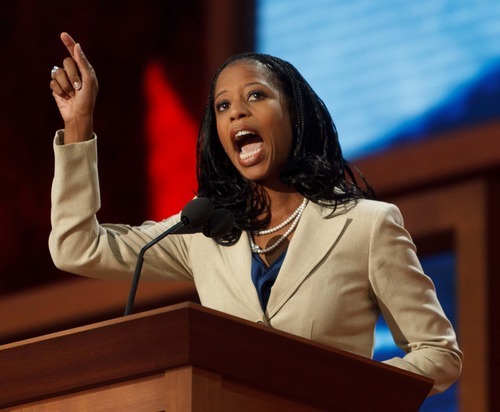This is an archived article that was published on sltrib.com in 2012, and information in the article may be outdated. It is provided only for personal research purposes and may not be reprinted.
September: When temperatures cool and politics heat up.
And no race in Utah will be hotter and get more attention than Utah's 4th Congressional District battle between Democratic Rep. Jim Matheson and Republican challenger Mia Love.
With less than eight weeks to go, the candidates have increasingly been taking swipes at each other, the airwaves are jammed with nearly $3.5 million in ads from the candidates and super PACs that are backing them — and there is no sign it will let up.
"I think it's going to be a blockbuster," said Quin Monson, director of the Center for Studies of Elections and Democracy at Brigham Young University. That is especially true, he said, if Love can show in the coming weeks that Matheson is vulnerable among moderate Republicans who have crossed over to support him in the past.
To that end, each has set out to define the other in the early stages of the advertising war.
Matheson has tried to paint the little known mayor of Saratoga Springs as a radical, targeting a 116 percent property tax hike she voted for while on the City Council and a series of federal budget cuts she proposed during the campaign — including axing federal grants to police departments and eliminating government-subsidized student loans, which she used to attend college.
"I happen to think that positions on issues matter in elections. And I think it's important for voters to be informed," Matheson said. "She seems to be hiding from those positions now and not responding when we call her on them."
Love says Matheson's is a diversionary tactic, hammering her record and trying to make her appear extreme in order to avoid having to talk about his own votes.
"You want to know what's extreme? Stimulus. The biggest stimulus we have ever seen," she said. "That's not Utah. Supporting a president that doesn't support Utah, Cash For Clunkers, Obamacare. That's extreme."
Matheson voted for the stimulus bill and Cash For Clunkers. He voted against the Affordable Care Act, initially voted against its repeal, but supported repeal in the most recent vote.
Love, meantime, has been trying to introduce herself to voters and hitch her campaign as closely as possible to Mitt Romney and literally wrapping herself in the flag in her advertisements.
Her television ads tout her support for Romney, while the National Republican Congressional Committee ties Matheson to President Barack Obama. It is a strategy that boils down to simple math, said Guy Harrison, executive director of the National Republican Congressional Committee (NRCC).
"I think the key point is Romney could hit 80 percent in this district," Harrison said, "so [Mia has] just got to stay within 30 points of that."
To help Love achieve that, the NRCC has committed to pouring $1 million or more into Love's campaign, a figure that Harrison said would be "a down payment." As of Friday, the committee had spent more than $988,000 buying up airtime, a bid to erase Matheson's fundraising advantage.
Love's campaign buys have been more modest — a little more than $250,000 so far. The last several have just been a few ads over a few days, and Love has been soliciting donations on Twitter to stay on the air, although the campaign insists it's not running out of money.
She brought in about $250,000 around the time of a high-profile speaking engagement at the Republican National Convention, raised another $100,000 at a fundraiser with former Secretary of State Condoleezza Rice. She has also had House Speaker John Boehner, Sen. John McCain and House Budget Chairman Paul Ryan — before he was the vice presidential nominee — in the state to raise money for her.
Her campaign has also seen considerable turnover and just recently replaced its spokesman and brought on Utah Republican Party executive director Ivan Dubois as a senior adviser.
Monson said Love has to show she is making inroads against Matheson within the next few weeks or the national support could dry up.
"She has had lots of high-profile media attention … and that's trickled down to some fundraising success," he said. "I think there's lots of positive signs, but for all those people to stay involved … she's going to have to make some progress. They're going to want to see her candidacy is able to resonate a little bit."
Matheson has booked more than $700,000 in airtime and has more than $1.4 million in support from Democratic political action committees.
Where the race stands is a bit of a mystery. The only polls in the race show Matheson 15 to 18 points ahead, but there haven't been any polls since the candidates began campaigning in earnest.
Damon Cann, a political science professor at Utah State University, said that, at this early stage, he thinks it is "Matheson's race to lose."
"Mia Love has kind of struggled to gain some traction," he said. "She brings a compelling background and good experience as mayor to the race, but in terms of a clear portrait of what she would do in Congress, I just don't think she's done a very good job of creating a clear contrast with Jim Matheson."
Cann said the Romney effect in Utah will likely help Republicans down ticket, but Matheson has shown the ability to persuade Utah Republicans to vote for him before. Matheson says he thinks they will support him again.
"I know there are a lot of Romney voters who are going to vote for me. I think there are a lot of similarities between me and Mitt Romney," he said. "I think Utah voters take their vote seriously, and they don't just vote party line. … I think I talk about what kind of congressman I am. She doesn't talk about what she's going to do, and she doesn't take any positions. She just ties herself to Mitt Romney, and I don't think that qualifies you to be a member of Congress."





